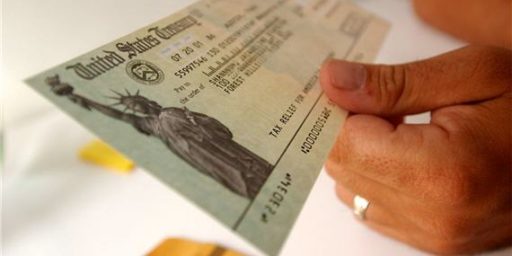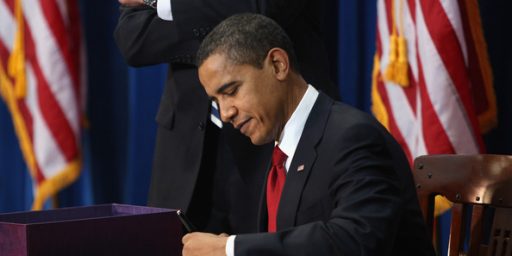A Question of Stimulus
Now that the stimulus package has passed, as James noted below, the conventional wisdom, as we discussed yesterday on OTB Radio, seems to be that this stimulus package won’t actually stimulate the economy at all. The thinking here goes to the effect that the economic stimulus comes when people say, “Cool, an extra 600 bucks! I’m going to buy a new TV.” But since most people receiving a stimulus in this round of rebates are expected to either (a) save the money or (b) spend it on debt, the common thinking seems to be that there’s no stimulus at all.
But after thinking about it for awhile, I wonder if this is actually the case. Because think of it this way: the primary economic trouble going on right now is in the banking industry, because consumers are defaulting on mortgages and its feared that credit cards are next, right? If this is the case, though, wouldn’t people putting their tax money in the bank, either in the form of a debt payment or a savings account, be a good thing? After all, more debt payments mean fewer defaults, and more savings means more money to cover loans.
So, if the common wisdom is correct and most of the tax rebate money is going to wind up in the bank one way or the other, won’t that help stabilize the credit issues? And if it’s those credit issues that are underlying the current woes in the economy, wouldn’t the rebates help out the economy overall?
I’m no economist, so if there’s some flaw in my thinking here, by all means drop them in the comments below.






I tend to agree. IN several cases I know of such funding well go to paying off at least part of longer term debts.
Put the cash in the bank? Yeah right–I’m headed straight to the dog track.
All of this is just a short term fix. And truth be told, it has been happening over past 3 decades. Reagan and Clinton have just as much blame as the current administration. This is an interesting perspective on this(the midas touch)
While it may help the bottom lines of retailers, it’s not going to create any jobs except, possibly, in China.
That’s a reasonable hypothesis, James, but it’s based on a faulty assumption – that the problem with the economy is that there’s not enough consumer spending now (or that more will save it). The problem is that the basic economic system in the US (and yes, Dems have a significant share of the blame here too) is rigged to make things easier for the wealthy and harder for the poor & middle class. This “stimulus” doesn’t actually address any of the problems that got us where we are now – zero oversight, zero or pissant penalties on lawbreaking corporations & high corporate muckety-mucks, cuts in gov’t support to ordinary people accompanied by huge subsidies to people & companies that don’t actually need them, etc., etc.
At best, this will allow some folks to stave off the wolves at the door for another billing cycle or two, and then things will be exactly the same as they are now.
Let’s look at this from a savings perspective.
If you take the $600 and put it into an account here ‘s how well you can do with just that.
$600 x 3% x 5yrs = $1854.60 (using future value of annuity)
$600 x 3% x 10yrs = $5,335.20 (using future value of annuity)
That’s if you don’t touch it and earn a solid 3% each year.
25 yrs = $21,875.40
and the big ol’ 50: $67,680
All from a government refund.
Of course, that means you are placing $600/yr into your account on top of what the gov’t gives you.
Perhaps we should fix our school system instead of our economy.
Ah, so it’s not: “All from a government refund.”.
That makes even less sense. If you put $600/year of your own money into your account for every year after this rebate, in 5 years you would have put in $3,000, how you get $1854.60 from a 3% interest rate on that is beyond me.
Not to mention that none of this takes into account the concept of inflation – if it ever goes above 3%, you’re suddenly losing money by keeping in that account…
Its all about the inflation.
The tax rebate is a way to complement the fed’s low interest rate policy in a way with voter approval.
No one’s going to argue about getting their tax money back, even if the effect of that money is to drive up prices in everything.